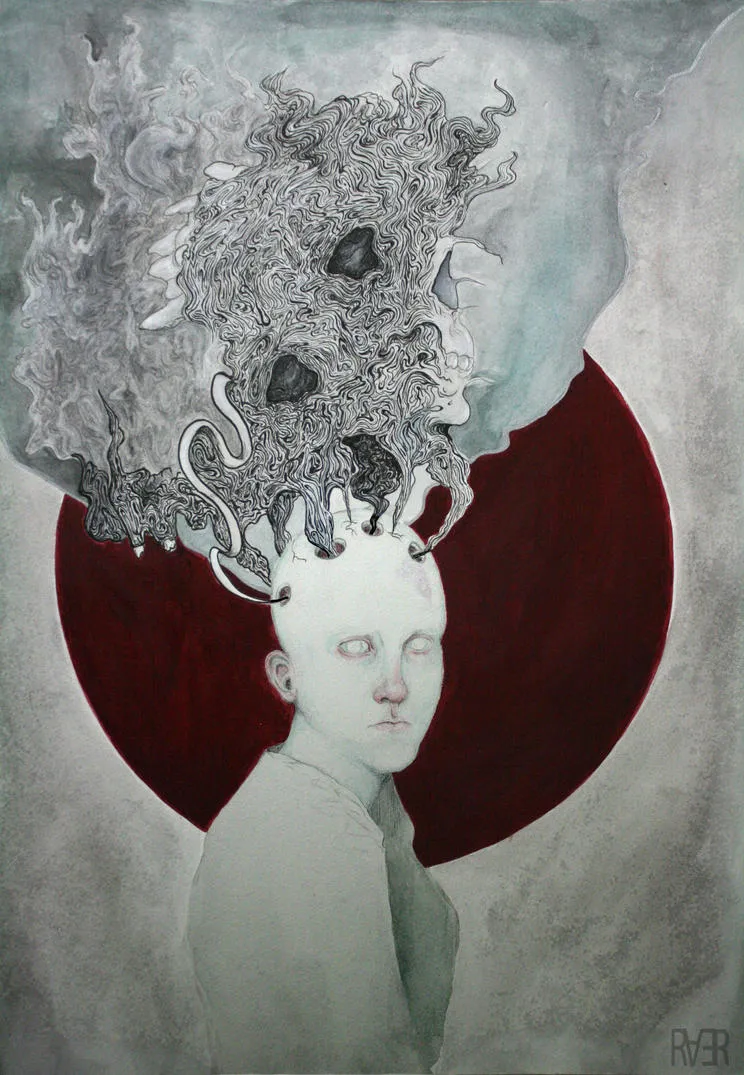3 Mindful Tips On Dealing With Negativity From Within
Intrusive thoughts are thoughts that consistently enter your mind against your will. They're considered intrusive because you simply cannot get them out of your mind, and they often pop up at unusual moments. Intrusive thoughts may also occur in flashes, and often cause significant anxiety when they enter your mind.
Who isn't stressed right now?
Having depression or a mental illness can cause countless negative thoughts to invade your mind. The world we live in today has made our lives harder in more ways than we thought possible. Stuck at home, away from social gatherings, and losing loved ones takes a toll on all of us. All of these factors culminate into a sense of dread that can weigh on us every single day we stay dormant in this new version of normal.
Whether you are worried about yourself or others, it can slowly begin to eat away at your brain until it is the only thing left. Despite these hardships, we as human beings must stay vigilant towards a better and brighter future for those who are working tirelessly to treat and protect others from the chaos of a virus, the hatred of democracy, and the brutality amongst minorities and asylum seekers.

Here are a few mindful tips to bring more light and peace into your mind that may be clouded by darkness and negative and intrusive thoughts.
1. Creativity is Key
I know you may see this on every guidance counselor's wall at school, but it has truth in those words. Finding an artistic or creative way to remove oneself from their stress can be through reading a book or even finding a show/movie to watch. It can provide an escape to a fantasy of wonder while we all ignore the headache that awaits us outside.
Writing is one of the most powerful tools at our disposal. Having trouble processing your thoughts? Want to be more in touch with your emotions and feelings? This idea is the first step towards that process.
A researcher from the University of Texas "found that when we translate an experience into language by writing it down, we essentially make the experience graspable" (Grate). According to a study published by Cambridge University Press, writing daily for 20 minutes over a 4 month period helped patients lower their blood pressure and improve their liver functions.
2. Consistent Anxiety Can Be Controlled
Escaping reality can be fun; however, if the symptoms you feel are mainly of a repetitive nature, you should NOT avoid them. According to Dr. Winston and Dr. Seif, experts in treating anxiety disorders, unwanted thoughts are only "reinforced by getting tangled with them, worrying about them, struggling against them, [or] trying to reason them away."
Below, is a guide to handling these thoughts when they stick to your brain:
- Label them as "intrusive"
- Remember that they come without a warrant and appear automatically
- Allow them in without trying to push them out or away
- Work on letting these feelings come as time passes
- Remind yourself to have patience because there is no urgency to them
- Prepare yourself knowing that they may reoccur
- Continue doing your task prior to these thoughts allowing the anxiety to be present
The key lies in leaving these intrusive thoughts alone. Allowing them to come and go without engaging directly will make the stress decrease over time desensitizing yourself to them. With this in mind, you should be able to tackle these thoughts whenever they come to mind.
3. Take Action To Remove Negativity
Lastly, if you aren't satisfied with the personal way of handling these stressful thoughts, decide what type of action you want to take. There are a variety of ways to get involved without putting yourself at risk. Knowing what type of message you wish to spread can be the first step in this process. Websites such as powerof.org allow people to select the issues they care about and narrow them down by their current home. This process gives people better access to issues in their own community that needs more attention and shows what opportunities are available in that area.
Another website called zooniverse.org has multiple projects that allow anyone to research topics that need to study data, solidify information, and gain better awareness on topics. To begin, browse the projects posted, and find one that interests you. With over 500 million volunteers already contributing to this platform, the Zooniverse is an amazing tool that brings people together towards a goal that they care about. Not only is this website a great tool for communities to work on topics of importance, you learn and research topics that need more eyes for the data to get published sooner.
Overall...
Stress and unwanted thoughts plague everyone from time-to-time. There are always actions that you can take to find more peace of mind. Work towards what makes you feel better and check on others who might need to take a break from their mind's battleground.
Opinions and Perspectives
Finding the right creative outlet takes time, but it's worth the exploration.
Realizing these thoughts come without warning helped me stop blaming myself for them.
The gradual approach to dealing with intrusive thoughts makes so much sense.
Taking action really does help. Started volunteering and it's made a huge difference.
These techniques have helped me recognize patterns in my negative thinking.
The connection between mental and physical health mentioned in the research is fascinating.
Been doing the 20-minute writing exercise. Surprising how time flies when you're honest with yourself.
Appreciate how these techniques can be adapted to different situations and preferences.
The article's approach to anxiety management feels more sustainable than quick fixes.
Started using the labeling technique last week. Already noticing a difference in how I react to thoughts.
These strategies work better when I remember self-compassion. We're all doing our best.
I write fiction based on my feelings. It helps create distance while still processing emotions.
The emphasis on allowing thoughts rather than fighting them is revolutionary for me.
Exercise definitely helps. I combine it with the mindful acceptance approach mentioned here.
Wish the article had addressed physical exercise. I find it crucial for managing negative thoughts.
The community aspect of Zooniverse is appealing. Nice to feel part of something bigger than myself.
Started small with these techniques and gradually built up. Patience really is key.
The article makes a good point about how current events affect our mental health. Everything feels more intense lately.
I've found combining creativity with social connection helpful. Started an online book club with friends.
Yes! I use the acceptance technique mentioned in the article specifically for bedtime thoughts.
Anyone else notice their intrusive thoughts get worse when trying to sleep?
Love the suggestion about finding local causes to support. Feels more meaningful than general online activism.
The idea that we shouldn't fight intrusive thoughts changed my whole approach to anxiety management.
Just downloaded a journaling app after reading this. Hope it helps as much as traditional writing.
Really appreciate the practical steps for handling intrusive thoughts. Having a clear process helps.
Yes, anxiety can block creativity. I start with simple doodles when I'm feeling stuck.
The research about writing and blood pressure is encouraging. Makes me want to start journaling again.
I like how the article emphasizes patience. These aren't quick fixes but long-term strategies.
Been trying these techniques for a while. They work better some days than others, but that's okay.
The article's point about helping others is spot-on. Volunteering has given me perspective on my own struggles.
I set a timer for 20 minutes right after my morning coffee. Making it part of my routine helped tremendously.
The writing suggestion is great but I struggle to maintain consistency. Any tips for making it a daily habit?
I understand feeling overwhelmed. I started with just one technique and gradually added more as I got comfortable.
Does anyone else feel overwhelmed by the number of self-help strategies out there? Sometimes less is more.
Interesting point about meditation. I combine it with the labeling technique and it's been really effective.
The article could have mentioned meditation. I've found it complements these approaches really well.
Implementing these strategies takes practice. Took me weeks to get comfortable with not fighting intrusive thoughts.
The tip about continuing tasks while letting anxiety be present resonates with me. It's like acknowledging the rain while still walking forward.
I get that feeling about perfectionism. The key is remembering the process matters more than the result.
Wonder if anyone else finds that creative activities sometimes trigger more anxiety? Sometimes I get too perfectionist about it.
Never thought about labeling thoughts as 'intrusive' before. Tried it today and it created an interesting mental distance.
The article mentions reading as an escape. I've found fantasy books particularly helpful in breaking negative thought cycles.
True about professional help. I combine these techniques with therapy and it works better than either approach alone.
These strategies are helpful but let's not forget that professional help is sometimes necessary too.
I've noticed that trying to reason away intrusive thoughts never works for me. Letting them pass through is much more effective.
The liver function improvement mentioned in the study is interesting. Would love to see more research on how mental health practices affect physical health.
Been volunteering through powerof.org for a month now. Can confirm it helps shift focus from internal negativity to external positive action.
What strikes me most is how these thoughts come without warning. It's comforting to know there are ways to manage them rather than eliminate them completely.
The creativity suggestion works wonders for me. I've started painting and it's like meditation with colors.
Not all online time is created equal though. There's a difference between mindless scrolling and engaging in meaningful discussions like this.
Anyone else find it ironic that we're discussing mental health strategies while spending more time online? Sometimes I wonder if that's part of the problem.
I appreciate how the article acknowledges that we're all struggling right now. Makes me feel less alone in dealing with these issues.
My therapist suggested similar techniques for handling intrusive thoughts. The key really is accepting their presence without engaging with them.
Just started using powerof.org after reading this. It's amazing how helping others can lift your own mood.
The blood pressure study results surprised me. I wonder if typing has the same benefit as handwriting thoughts down.
I can relate to that. But I've found small steps help. Even reading this article is a step toward understanding and managing these thoughts better.
The article makes it sound so simple but dealing with intrusive thoughts is seriously challenging. Some days I can barely function.
Actually tried the labeling technique mentioned and it's helped me tremendously. When I started calling thoughts 'intrusive' it took away some of their power.
Not sure I agree with the 'escaping reality' bit. Sometimes we need to face our problems head-on rather than distracting ourselves.
Has anyone tried the Zooniverse platform mentioned in the article? I'm intrigued by the idea of contributing to research while taking my mind off negative thoughts.
I find it fascinating that writing for just 20 minutes daily can actually improve physical health markers like blood pressure. The mind-body connection is incredible.
The part about not fighting intrusive thoughts is counterintuitive but makes so much sense. I've always tried to push them away which probably made things worse.
Writing has been my saving grace during tough times. I started journaling last year and it's amazing how much clearer my mind feels after putting thoughts on paper.
I've been struggling with intrusive thoughts lately and this article really resonates with me. The creativity suggestion especially caught my attention since I used to love writing but haven't done it in ages.

